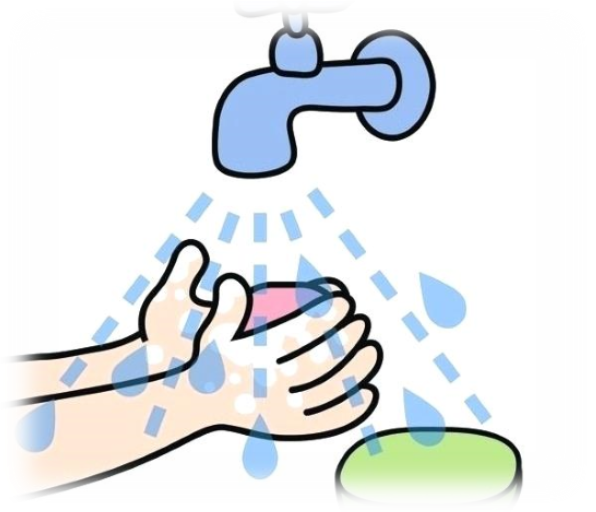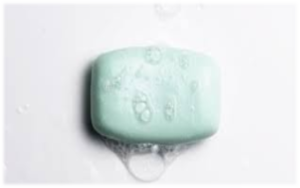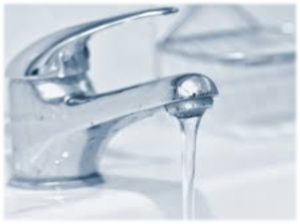
Why Should I Wash My Hands?
Keeping your hands clean is one of the most important steps we can take to avoid getting sick and spreading
Microbes: All tiny living organisms that may or may not cause disease. Germs: Also, known as pathogens, are types of microbes that can cause disease
- On a daily basis we may come into contact with surfaces and/or objects that may be contaminated with germs and if we do not wash our hands we may become sick
- We frequently touch our eyes, nose and mouth without realizing it and when we do so without clean hands then we may become sick
- When preparing food or drinks with unclean hands we can transfer germs to the food and get the people who consume them sick
- Removing germs through hand washing helps prevent diarrhea and respiratory infections and may even help prevent skin and eye infections
- By washing our hands and preventing sickness related to germs on unclean hands we can reduce the amount of antibiotics people use and the likelihood that antibiotic resistance will develop
Step 1
Wet your hands with clean, running water (warm or cold), turn off the tap, and apply soap
- Really, I can use cold water?
Yes, the temperature of water does not appear to affect microbial remove, but warmer water may cause more skin irritation and is more environmentally costly. - Won’t I get more germs on my hands if I turn off the tap, apply soap and then turn on the faucet again?
No, there is not much evidence to prove whether a significant number of germs are transferred between hands and faucet. However, turning off the faucet after wetting hands saves water! - I do not have “antibacterial” soap, but I do have plain soap, will this be ok?
Yes, studies have shown that there is actually no added health benefit for consumers (this does not include professionals in the healthcare setting) using soaps containing antibacterial ingredients compared with using plain soap.
Step 2
Lather your hands by rubbing them together with the soap. Be sure to lather the backs of your hands, between your fingers, and under your nails.
Washing hands this way creates friction, which helps lift dirt, grease and microbes from skin.
Step 3
Scrub your hands for at least 20 seconds.
- Do I really have to scrub for 20 seconds?
Evidence suggests that washing hands for 15-30 seconds removes more germs from hands than washing for shorter periods of time. A good way to keep time is to sing or hum the “Happy Birthday” song from beginning to end twice.
Step 4
Rinse your hands well under clean, running water.
Should I use a paper towel to turn off the faucet after my hands are rinsed?
- You can, but there are no studies to show that this improves health and this leads to increased use of water and paper towels.
What if I do not have access to clean, running water and soap?
- The CDC recommends washing hands with soap and water whenever possible, but when soap and water are not available using a hand sanitizer with at least 60% alcohol can help you avoid
getting sick and spreading germs to others.
Quick Facts About Hand Sanitizer
- Alcohol-based hand sanitizers can quickly reduce the number of microbes on hands in some situations, but sanitizers do not eliminate all types of germs
- Soap and water are more effective at removing certain kinds of germs like norovirus and clostridium
- People may not use a large enough volume of sanitizer or may wipe it off before it has dried and therefore may not effectively inactivate germs it would when used appropriately
- Hand sanitizers may not be effective when hands are visibly dirty or greasy
- It is better to wash your hands with soap and water after activities where hands may become very greasy or soiled like handling food, playing sports, working in the garden or
going fishing - Hand sanitizers may not remove harmful chemicals, like pesticides and heavy metals, from hands
- One study has reported that people who used hand sanitizer to clean hands had increased levels of pesticides in their bodies. If your hands have touched harmful chemicals, it is better to wash your hands with soap and water (or as directed by a poison control center)
- Hand sanitizers without 60-95% alcohol may not work equally well for many types of germs and may merely reduce the growth of germs rather than kill them outright
- Swallowing alcohol-based hand sanitizers can cause alcohol poisoning
- From 2011-2015, U.S. poison control centers received nearly 85,000 calls about hand sanitizer exposures among children. Children may be particularly likely to swallow hand sanitizers that are scented, brightly colored or attractively package. Hand sanitizers should be stored out of reach of young children and should be used with adult supervision
How Do I Use Hand Sanitizer?
Step 1
Read the label to learn the correct amount of product to be used
Step 2
Apply the product to the palm of one hand and rub the product all over the surfaces of your hands until your hands are dry




